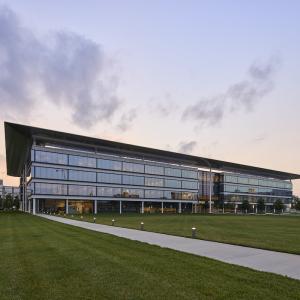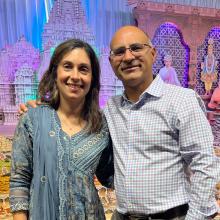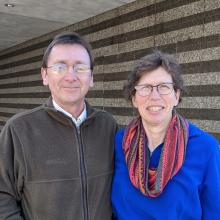Alumni gifts for professorships doubled, thanks to anonymous donor
Editor's note: Five years ago, an anonymous $20 million challenge grant made it possible for Case School of Engineering and CWRU School of Medicine to endow 10 new professorships each—if they secured matching commitments from other donors. The effort proved so successful that three years later, the university received a second $10 million challenge grant to create five additional professorships at each school.
Below are stories about how the matching opportunity allowed two alumni couples to establish professorships—each focused on an area of personal meaning.
Vijay Marwaha, MD (MED ’99, MGT ’99), and Dinaz Italia (GRS ’99, nutrition) want to spare others the pain of losing loved ones to terminal illness.
For Marwaha, the cause was an autoimmune disease that struck his sister. His wife, meanwhile, saw ovarian cancer claim her mother.
The two have chosen to pay tribute to their respective family members by endowing the Marwaha-Italia Family Professorship—specifically designated for a researcher developing treatments for cancer and diseases of the immune system.
Part of the inspiration for the couple’s gift came from the experience of Italia’s sister. After their mother’s passing, both siblings participated in genetic testing to identify likely risks.
Italia’s sister tested positive for BRCA, a gene mutation that indicates an increased risk of developing certain cancers. In the follow-up process, her sister was diagnosed with stage one ovarian cancer. While early detection likely saved her sister’s life, the treatments involved gave Italia pause.
“My sister’s treatment for ovarian cancer was largely the same as our mother’s 35 years ago,” said Italia, a registered dietitian. “We hope this professorship will help bring about new therapies and make breakthroughs in the field.”
The couple is confident their alma mater was the ideal place for such work.
“We visited the university last year and it seems to have only become more impressive since we attended,” said Marwaha, who runs a private cardiovascular practice in southern New Jersey. “We want to support researchers, and there is no better place to do it than at CWRU.”
A holistic approach
Case Western Reserve brought Beth Sersig, MD (MED ’84), and Christopher Brandt, MD (WRC ’80, MED ’84), together more than four decades ago—and their connection to the university continues to this day.
Brandt holds the medical school’s Richard B. Fratianne Professorship in Surgery, and Sersig spent the majority of her career as a physician and director of women’s health at CWRU’s University Health and Counseling Services.
All along, they continued to give generously to the university.
“Looking back on our time [at CWRU], it’s all about the people,” said Brandt, who is a general surgeon and former chair of the Department of Surgery at the MetroHealth System in Cleveland. “The relationships we built—with our mentors and with classmates who became colleagues—are still important to us today.”
Those relationships are the motivation behind the couple’s gift to endow the Christopher Brandt and Beth Sersig Professorship in Family Medicine.
“This professorship will provide important resources,” Brandt said, “but it also honors Beth’s commitment to family medicine and how she approached patient care.”
Sersig, describes family medicine as a “person-first” model, considering the whole picture, not just the symptoms that may have prompted a visit.
“Family medicine promotes seeing the patient holistically,” she said, “and how their community influences their health.”
They hope this initiative will increase student interest and research in family medicine, in addition to providing faculty members with opportunities to expand their knowledge in the field.
“It’s easy for faculty members to get bogged down with day-to-day stressors,” said Brandt, “but with this extra support, hopefully they can interact with colleagues from other institutions and find new points of view. As students, [Beth and I] benefitted from professors who had similar resources, and this is just one way to keep that going.”
Originally published in the winter 2024 issue of Forward Thinking magazine




